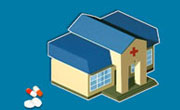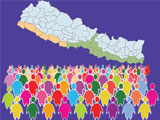Links
Bilateral and Multilateral External Development Partners
Australian Aid - Department of Foreign Affairs and Trade (DFAT)
 Provides pooled funding for the implementation
of NHSP-2 and project support to NGOs working in the water, sanitation and hygiene sector. (Formerly AusAID)
Provides pooled funding for the implementation
of NHSP-2 and project support to NGOs working in the water, sanitation and hygiene sector. (Formerly AusAID)
UKaid

- Provides pooled funding for implementing NHSP-2.
- Supports the Nepal Health Sector Support Programme (2011-2015), which provides technical assistance for policy level support to MoHP and the implementation of NHSP-2.
- Supports the Nepal Family Planning Project, which is due to start in 2014.
- Supports the Low Birth Weight in South Asia Trial programme (2011-2016) to generate evidence of ways of reducing maternal and neonatal malnutrition.
German Development Cooperation (GIZ)
 GIZ provides support for NHSP-2 through its Health Sector Support Programme (HSSP), focusing on:
GIZ provides support for NHSP-2 through its Health Sector Support Programme (HSSP), focusing on:
- the decentralisation of health service provision and system strengthening
- social health protection and equitable health financing, and
- sexual and reproductive health and rights, particularly of young people.
GAVI Alliance (Global Alliance for Vaccines and Immunisation)
 Between 2001 and 2012, GAVI disbursed $60 million to Nepal for improving access to vaccines and the management of the national immunisation programme. The major focus in 2014-2016 is helping MoHP deliver the five-in-one pentavalent vaccine and the pneumonia
vaccine (Pneumo NVS). GAVI provides pooled funding for the implementation of NHSP-2.
Between 2001 and 2012, GAVI disbursed $60 million to Nepal for improving access to vaccines and the management of the national immunisation programme. The major focus in 2014-2016 is helping MoHP deliver the five-in-one pentavalent vaccine and the pneumonia
vaccine (Pneumo NVS). GAVI provides pooled funding for the implementation of NHSP-2.
The Global Fund (The Global Fund to Fight AIDS, Tuberculosis and Malaria)
 The Global Fund has provided major funding for HIV, malaria and TB control programmes in Nepal under Global Fund rounds 2, 4 and 7. Funding is coming to an end for the following two major programmes:
The Global Fund has provided major funding for HIV, malaria and TB control programmes in Nepal under Global Fund rounds 2, 4 and 7. Funding is coming to an end for the following two major programmes:
- Malaria Control in Nepal through Primary Health Care System Strengthening and Partnership; and
- HIV/AIDS Prevention among Labour Migrants and Young People and Care for affected people.
KfW (German Development Bank)
 Provides pooled funding for the implementation of NHSP-2 and, up to 2013, provided technical assistance to Management Division and Logistics Management Division.
Provides pooled funding for the implementation of NHSP-2 and, up to 2013, provided technical assistance to Management Division and Logistics Management Division.
UNAIDS (Joint United Nations Programme on HIV and AIDS)
 UNAIDS coordinates the work of United Nations agencies and the World Bank for HIV prevention, care and treatment. UNAIDS’ 2011-2015 strategy is aimed at ‘Getting to zero’ HIV cases. Ten UN agencies collaborate under the joint programme (ILO, IoM, UN Women,
UNDP, UNFPA, UNICEF, UNODC, WFP, WHO, World Bank).
UNAIDS coordinates the work of United Nations agencies and the World Bank for HIV prevention, care and treatment. UNAIDS’ 2011-2015 strategy is aimed at ‘Getting to zero’ HIV cases. Ten UN agencies collaborate under the joint programme (ILO, IoM, UN Women,
UNDP, UNFPA, UNICEF, UNODC, WFP, WHO, World Bank).
United Nations Children's Fund (UNICEF)
 UNICEF supports the implementation of NHSP-2 under a Joint Financing Arrangement (JFA)
along with pooled funding partners. Its Country Programme Action Plan (2013-2017) calls for the following health and nutrition interventions targeted at disadvantaged parts of the country:
UNICEF supports the implementation of NHSP-2 under a Joint Financing Arrangement (JFA)
along with pooled funding partners. Its Country Programme Action Plan (2013-2017) calls for the following health and nutrition interventions targeted at disadvantaged parts of the country:
- Improved policies and strategies on maternal, newborn, child and adolescent health.
- Quality equitable health services.
- Essential maternal, adolescent, newborn, infant and young child feeding.
- Implementing the Multi-Sectoral Nutrition Plan.
- Access to and utilisation of essential nutrition services.
- Promoting healthy behaviour
United Nations Office on Drugs and Crime (UNODC)
 UNODC’s technical cooperation programme in Nepal is made up of interventions for HIV prevention, care and support for drug users (male and female) and in prisons. It also supports the government to implement parts of the comprehensive package for HIV
prevention.
UNODC’s technical cooperation programme in Nepal is made up of interventions for HIV prevention, care and support for drug users (male and female) and in prisons. It also supports the government to implement parts of the comprehensive package for HIV
prevention.
United Nations Population Fund (UNFPA)
 UNFPA support the implementation of NHSP-2 under a Joint Financing Arrangement (JFA) along with pooled funding partners. UNFPA’s 2013-2017 programme focuses on the following areas related to improving the health of young people and marginalised women:
UNFPA support the implementation of NHSP-2 under a Joint Financing Arrangement (JFA) along with pooled funding partners. UNFPA’s 2013-2017 programme focuses on the following areas related to improving the health of young people and marginalised women:
- young people’s sexual and reproductive health and sexuality education;
- gender equality and reproductive rights; and
- population dynamics.
United States Agency for International Development (USAID)
 USAID supports the implementation of NHSP-2 under a Joint Financing Arrangement (JFA) along with pooled funding partners. It supports the following and other health projects:
USAID supports the implementation of NHSP-2 under a Joint Financing Arrangement (JFA) along with pooled funding partners. It supports the following and other health projects:- The SUAAHARA Project (2011-2016) for strengthening policies and programmes to improve the health and nutrition of women and children.
- The Saath-Saath Project (2011-2016) to reduce the transmission and impact of HIV and AIDS and to improve reproductive health among most-at-risk populations.
- The Health for Life (H4L) Project (2012-2017) to strengthen the government’s capacity to plan, manage and deliver quality family planning and maternal, newborn and child health services.
- The Ghar Ghar Maa Swasthya (Healthy Homes) Project (2010-2015) works with the Nepal Contraceptive Retail Sales (CRS) company to increase the accessibility and availability of family planning and public health products, especially in hard-to-reach rural areas.
- The Strengthening Rehabilitation in District Environs (STRIDE) Project (2010-2016) is improving physical health rehabilitation services.
The World Bank

- The Second Health Nutrition and Population (HNP) and HIV/AIDS Project is enabling the government to increase access to essential health care services and their use by underserved and poor people (2010- 2015). The World Bank provides its pooled funding for implementing NHSP-2 under this project.
- The Zoonoses Control Project (ZCP) (2012-2014) is enhancing Nepal’s capacity to prevent and control infectious diseases that transmit between animals and humans
World Health Organisation (WHO)
 The World Health Organisation (WHO) is a specialised agency of the United Nations (UN) that is concerned with international public health. WHO supports the implementation of NHSP-2 under a Joint Financing Arrangement (JFA) along with pooled funding partners.
The current priorities of WHO include communicable diseases, in particular, HIV/AIDS, malaria and tuberculosis; the mitigation of the effects of non-communicable diseases; sexual and reproductive health, development, and aging;
nutrition, food security and healthy eating; occupational health; substance abuse. WHO also provides expert guidance to government and non-government organisations on health related issues.
The World Health Organisation (WHO) is a specialised agency of the United Nations (UN) that is concerned with international public health. WHO supports the implementation of NHSP-2 under a Joint Financing Arrangement (JFA) along with pooled funding partners.
The current priorities of WHO include communicable diseases, in particular, HIV/AIDS, malaria and tuberculosis; the mitigation of the effects of non-communicable diseases; sexual and reproductive health, development, and aging;
nutrition, food security and healthy eating; occupational health; substance abuse. WHO also provides expert guidance to government and non-government organisations on health related issues.




